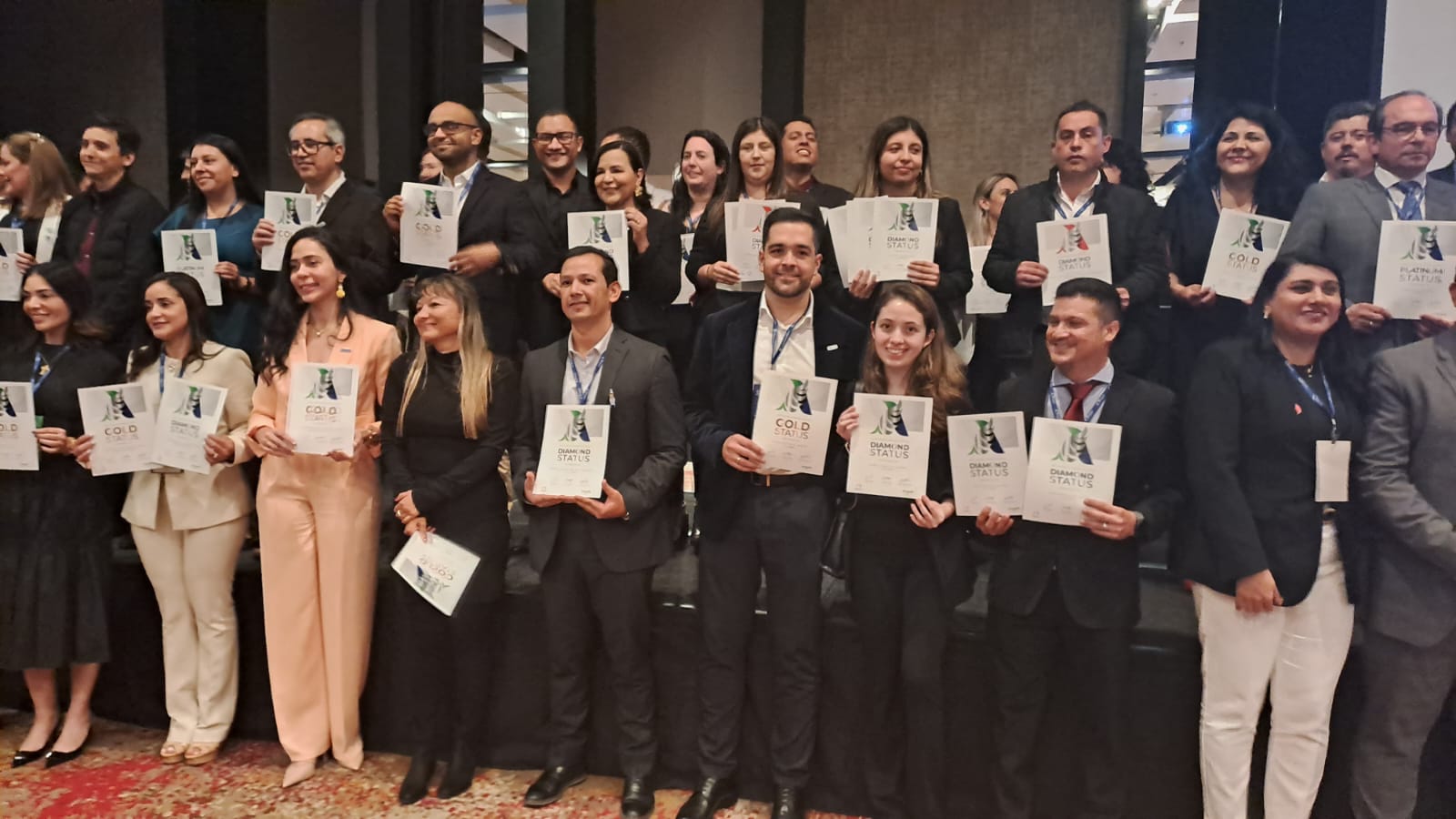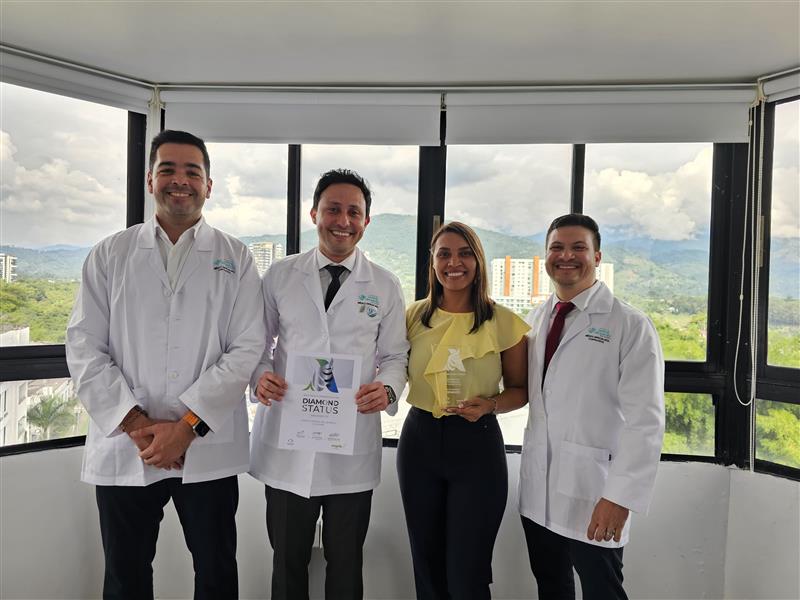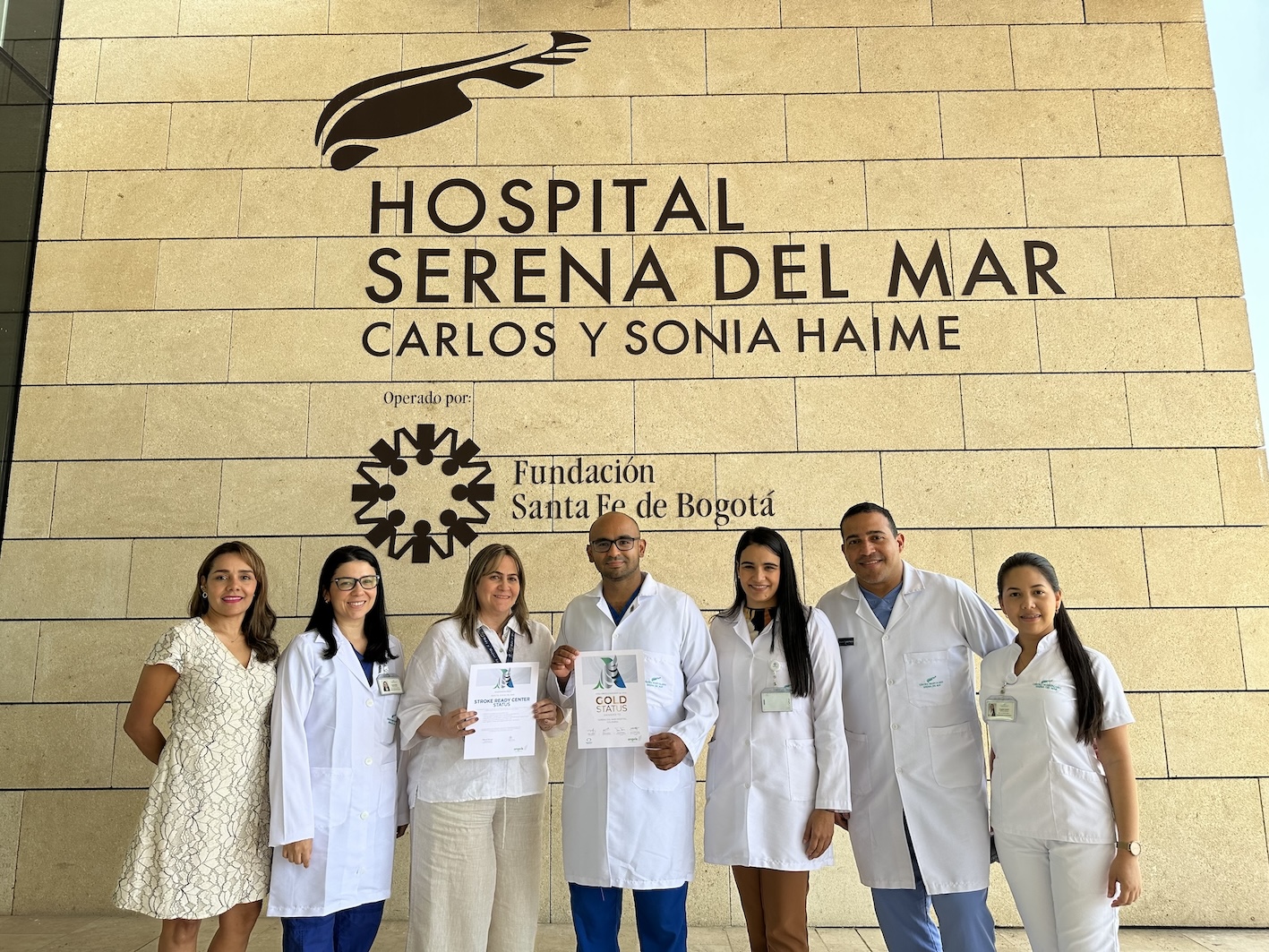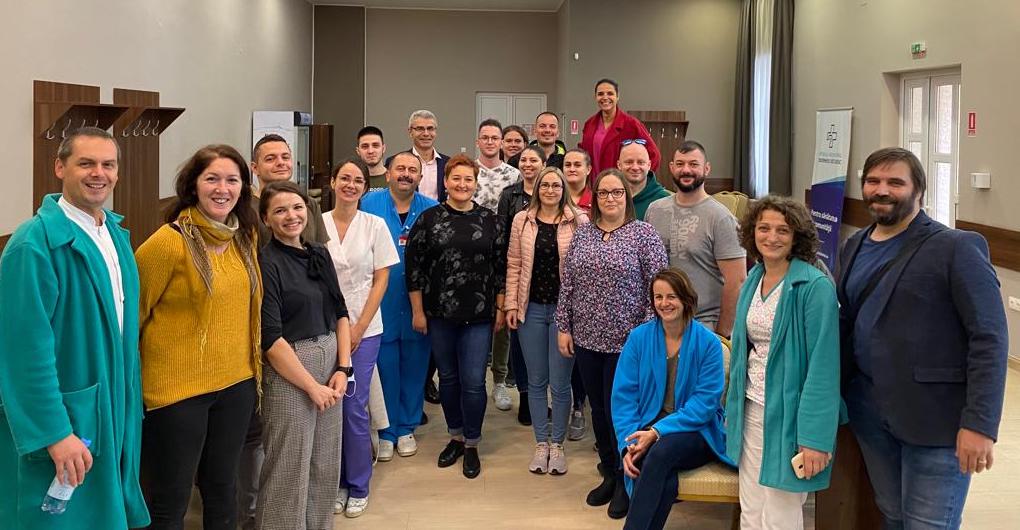
Poco antes del mediodía del viernes 7 de octubre, un hombre de 78 años de edad de la aldea Atid, cerca de Odorheiu Secuiesc, en el condado de Harghita, en el centro de Rumanía, sufrió un ictus en casa. Se convocó una ambulancia que llevaría al paciente al hospital más cercano.
Por la mañana esto sucedió, todavía había un solo hospital en el condado de Harghita donde los pacientes con ictus podían recibir tratamiento en la fase aguda con trombólisis para detener el daño causado por el ictus y darles una segunda oportunidad en la vida. Sin embargo, ese hospital se encontraba en la capital del condado, Miercurea Ciuc, a una hora y 42 minutos de distancia.
A mediados de octubre, el Hospital Municipal Odorheiu Secuiesc todavía no era un hospital que trataba el ictus. A las 16:00, esa tarde se habían convertido en uno. Exactamente cómo sucedió esto es una historia que se contará una y otra vez, porque ¿a quién no le gusta un giro de trazado con un final milagroso?
Un nuevo pin en el mapa
El neurólogo jefe del Hospital Municipal Odorheiu Secuiesc es un líder que disfruta de la confianza y el cariño de su equipo. El Dr. Pelok Benedek lleva algún tiempo sentando las bases para que su hospital empiece a tratar el ictus agudo. Ofreció formación al personal de enfermería, asistió a congresos sobre ictus, invitó a expertos a compartir sus conocimientos con su equipo y trabajó en el protocolo de ictus de su hospital.
Conociendo las aspiraciones del equipo de neurología de Odorheiu Secuiesc, la asesora de Angels M❏d❏lina Butuc les proporcionó materiales de Angels, incluidas listas de comprobación, una bolsa de ictus e información sobre el programa de concienciación sobre el ictus de los héroes de FAST, y les presentó al coordinador nacional de ictus y a la coordinadora de la red de ictus de Rumanía, la profesora Cristina Tiu.
“Vamos a poner otro alfiler en el mapa”, le prometieron al profesor Tiu. Habría sido el condado de Harghita el tercero del país en tener más de un hospital que trata el ictus.
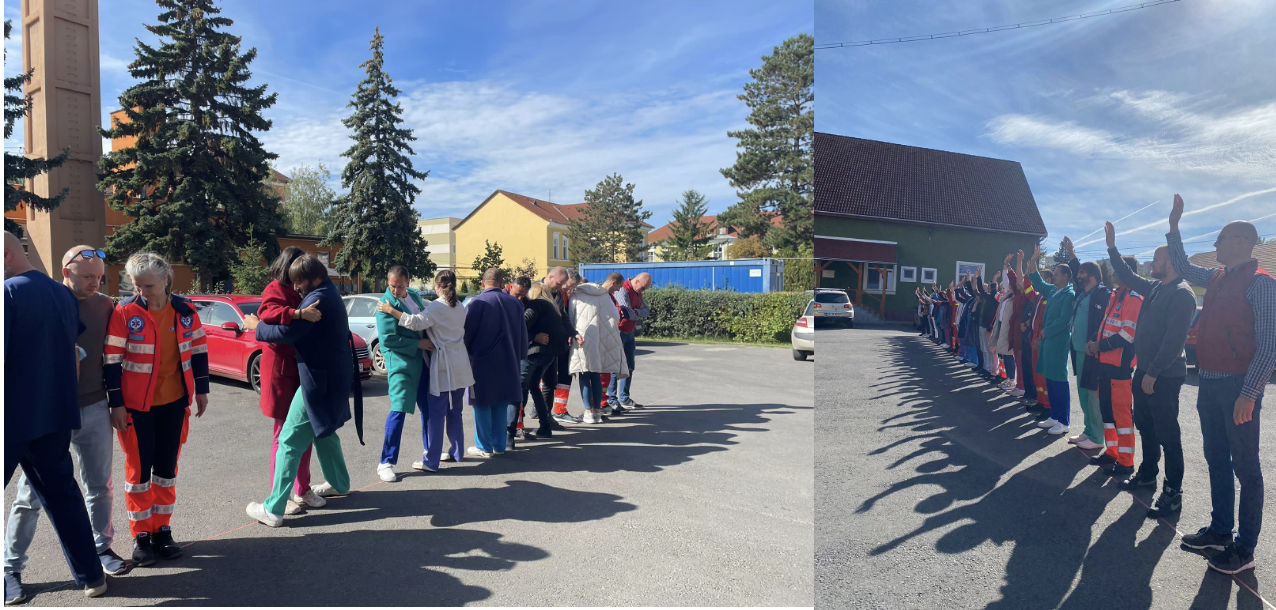
Un equipo que también es una comunidad
A medida que el verano llegaba a su fin, los planes se formaron para la formación de simulación a principios de octubre. Sería un taller de dos días dedicado a la formación, la formación de equipos y la simulación de circuito facilitado por médicos de hospitales cercanos. La Dra. Incze Emese, neuróloga y campeona en ictus, procedía de Miercurea Ciuc para compartir su experiencia.
La Dra. Csilla Forró, enfermera de urgencias Árpád Dorba y enfermera Enikó Nišui de Sfântu Gheorghe, en el vecino Condado de Covasna, inició pronto el camino a Odorheiu Secuiesc.
También estuvo presente Péter Szilárd, jefe del Harghita County Ambulance Service que en otras dos semanas recibiría su primer premio Angels de los servicios de emergencias médicas en una ceremonia en Berlín.
El Hospital Municipal Odoreheiu Secuiesc ya tenía varias cosas a su favor. Habían dominado los conceptos básicos del ictus; varios médicos más jóvenes habían estado expuestos a la trombólisis durante su residencia y, mientras la nueva asesora de Angels Bianca Pşnzariu observaba su primera experiencia en el campo, “este equipo era realmente un equipo”.
Solo tardaron dos minutos en completar un juego en el que tuvieron que organizarse en orden alfabético sin hablar ni romper la línea. A continuación, se dividieron en grupos en los que cada participante, ya fuera enfermero, radiólogo o portero, tenía que describir el papel de los demás.
“Podría sentir el ambiente cálido y la confianza entre ellos”, dice Bianca.
“Se dio cuenta de que era una comunidad”.
Juego de rol sobre circuito
El viernes por la mañana comenzó con un circuito dirigido por el Dr. Emese, cuyo hospital ha tratado a más de 160 pacientes con trombólisis y tiene dos premios Angels de la ESO.
En la simulación del juego de rol que siguió, todos desempeñaron sus funciones con convicción, desde el neurólogo que tuvo que experimentar el circuito desde el punto de vista del paciente hasta la enfermera que se rió con su actuación teatral como su esposa preocupada.
Se sintió “bastante real”, dice M❏dηlina, que inyectó la experiencia con parte del estrés y la adrenalina de un caso de la vida real.
Un tiempo simulado puerta-aguja de tan solo 24 minutos anima al equipo a mantener la conversación en alto. “¿Cuándo empezamos a tratar?”, alguien quería saberlo. “A las 14:00 h de hoy”, la Dra. Pelok se saltó. Su chiste trajo otra ronda de risa. La hora era a las 13:00 h.
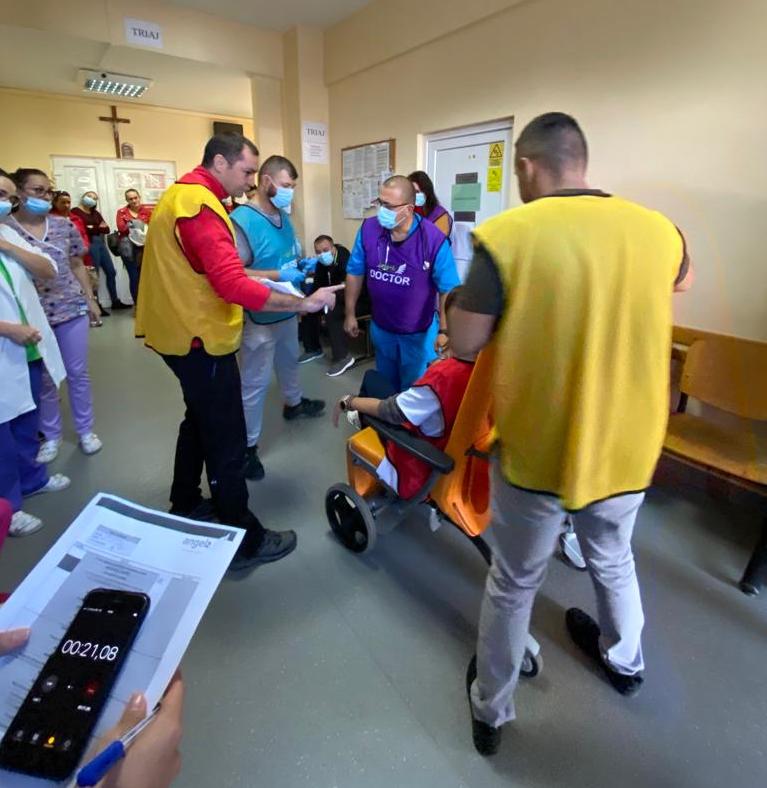
Esto no es un taladro
M❏detorolaclina, Bianca y la enfermera Árpád Dorba estaban de camino a casa cuando un mensaje hacía un ping en los teléfonos de M❏d❏lina y Árpád a la misma hora. La noticia fue que el Hospital Municipal Odorheiu Secuiesc acababa de trombolizar a su primer paciente.
La prenotificación había llegado exactamente a las 14:00. Un paciente con sospecha de ictus del pueblo de Atid estaba en camino. El paciente ya estaba en el borde de la ventana para la trombólisis: Miercurea Ciuc estaba simplemente demasiado lejos.
El equipo que minutos antes había estado revisando los eventos de la mañana con una taza de café, atravesó mentalmente el circuito que habían ensayado solo dos horas antes. El Dr. Pelok estaba a punto de cederle su turno a la Dra. Zima Zoltán, pero no una sola persona abandonó la sala. Y cuando la ambulancia llegó a las 239, estaban listos.
El tiempo desde la llegada al hospital hasta recibir tratamiento fue de 19 minutos. Y así, poco después de las 188 horas del viernes 7 de octubre, el Hospital Municipal Odorheiu Secuiesc en el condado de Harghita puso otro alfiler en el mapa.

